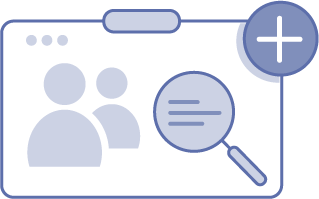About Clinical Studies
Taking part in a clinical study could help researchers find new, more effective treatments – changing both your life and the lives of others.
About CIMcare
CIMcare is exploring a drug, known as certolizumab pegol (CZP), to see if it can reduce psoriasis symptoms in children and teenagers.
The study is taking place in the US and Canada. The study is currently enrolling participants aged 12-17. Enrollment of participants aged 6-11 will begin approximately December 2020.
CIMcare will take just over 3 years to complete. During the first year, study participants will attend visits at the study site approximately once a month. In the second and third years, study participants will attend the study site approximately every 3 months. At these visits, the study team will perform different assessments to monitor the effect of the study drug.
The video gives a brief overview of the CIMcare study and who the study is suitable for.
CIMcare Timelines
CIMcare will take just over 3 years to complete and is made up of four main periods.

Screening
To take part in a clinical study, participants must meet specific entry criteria. During Screening, the study team will check if potential participants meet these criteria.

Study Treatment
During the Study Treatment period, study participants will receive their assigned study drug and attend the study site approximately once a month. The Study Treatment period will take approximately 36 months to complete.

Follow-Up
After study participants stop receiving the study drug, they will enter a 10-week Follow-Up period. At the end of the 10 weeks, study participants will have a visit at the study site and the study team will check the study participants’ health and well-being.
Your Child’s Participation
If your child qualifies for and is selected for the study, their participation will last for approximately 3 years. During this time, they will be expected to take the study drug as instructed and complete a range of assessments at regular site visits that are like those your child would complete as part of their standard care. For some visits, a qualified nurse may visit your home.
All participants in the study will take CZP with the exception of those between 12 to 17 years of age, for whom there is a chance that they will receive a placebo (which looks similar to the study drug but has no medically active ingredients) for the first 16 weeks before moving on to CZP. For more information about placebos, please refer to the FAQs.
If you contact a study site and are invited to discuss the study in more detail, you and your child will be provided with more information and have the opportunity to ask questions before deciding if your child will take part in the study. If you and your child decide to take part, you can withdraw your child from the study, or your child can withdraw themself from the study, at any time and for any reason.
Does My Child Qualify?
Please answer the following questions to see if your child may be eligible to participate in the CIMcare study.
When you are finished, click Submit.
Is your child 6 to 17 years of age?
Does your child weigh at least 20 kg (44 lb)?
Does your child have a diagnosis of moderate to severe chronic plaque psoriasis?
Are you and your child willing to travel to the study site for regular study visits for at least 3 years?
Can you confirm that your child is not pregnant and not trying to become pregnant?
Your child may be eligible.
Based on your answers, your child is potentially eligible for the CIMcare study. Please look at the map below to find your nearest site and contact details. The site will be happy to answer any questions you or your child may have and discuss next steps.
OK
Your child is not eligible.
Based on your answers, your child is currently not eligible for the CIMcare study. If your answers to any of these questions change, please check back to see if your child is eligible. Thank you for your interest.
OK
Find a Site
Please use the map below to find a study site near you.
FAQs
A clinical study is a medical research study involving people. It tests the use of a medical procedure, medical device, drug, or potential treatment, and is led by researchers and study doctors. Clinical studies provide valuable information and help us to improve healthcare. They can help us to understand a condition better and learn how best to treat it, and can lead to new treatments being made available.
It is important to involve children in clinical research studies because children have different treatment needs from adults–they need different doses of medication and types of therapies. Also, children sometimes have different medical conditions from adults. More relevant clinical research involving children is essential to increase our understanding of childhood conditions and improve pediatric healthcare.
Consent and assent both involve an agreement to take part in a clinical research study. Consent may only be given by people who have reached the legal age of consent in their location. This is usually 18 years of age. Assent is the agreement of someone who cannot give legal consent to participate in the study. Work with children requires the consent of the parent or legal guardian, and the assent of the study participant.
‘Informed consent’ means that the person giving consent understands what happens in the study and what the benefits and risks of taking part in the research study are. It also includes agreeing to participate in the study. Participation is voluntary and consent can be withdrawn at any time. The informed consent process involves the study team clearly communicating the nature of the research and everything that is involved and happens in the study, including risks and benefits. After this, and if the person agrees to participate, an informed consent form and/or assent form is signed and dated to document this conversation.
A placebo is a pill, injection, or other substance that looks similar to the drug under investigation, but it does not contain any active drug or medicine, i.e. it doesn’t contain any drug or medicine that is meant to affect a person’s health.
In the CIMcare study, the placebo is a saline solution, i.e. a solution containing a similar amount of salt as is already present in the human body. As the study drug will be given as an injection, the placebo will also be given as an injection.
Sometimes, people receiving placebos can experience improvements in their health or what appear to be side effects, even though the placebo contains no active medication.
This is called the ‘placebo effect’ and it can be caused by a number of psychological factors, including expectations. For example, just expecting the placebo to improve health has been known to make a person feel better.
If your child receives the placebo for the first 16 weeks, they will be receiving a substance that is not intended to treat their psoriasis or have any other effect on their health. However, they may experience a placebo effect.
After the first 16 weeks, your child will receive CZP for the rest of the study.
Your child’s participation in this study may last up to 169 weeks (just over 3 years), but you and your child are free to withdraw from the study at any time. If you wish to withdraw your child from the study, or if your child wishes to withdraw from the study, please contact the study site personnel.
All medications, both those that are approved and those undergoing clinical studies, may potentially cause side effects. Some of these are known, but there could be others that have not previously been seen. Study procedures may also involve risks. You will be informed by the study team about all of the known potential side effects of the study drug and study procedures. If any further risks are discovered while the study is ongoing, you and your child will be informed immediately.
Your child is free to leave the study and you are free to withdraw them from the study at any time and this will not affect their future care in any way.
If your child’s condition gets worse after they start the study, the study team will discuss additional or alternative treatment options with you and your child, if necessary. These options may include: continuing with the study drug, withdrawing from the study, switching to a different type of treatment, or taking medication to relieve the symptoms.
Your child’s health and well-being are of the utmost importance during the study, and any decisions regarding the study drug or alternative treatments will be made with that in mind.
Your child’s data will be collected, handled, and processed in compliance with applicable regulatory guidelines. It will not be shared with anyone other than in circumstances that will be explained in your informed consent form.
The study team will keep your child’s identity strictly confidential. At the start of the study, your child will be assigned a unique number. Any data sent to the study sponsor–that is, the company who are running the study–will be identified only by this number.




